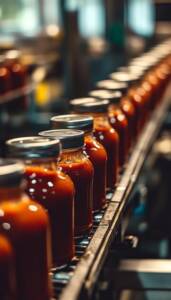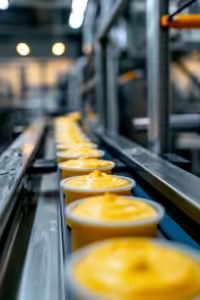
Sauces are a cooking staple in all kitchens around the world. Whether they are used to enhance flavor, add texture, or enhance the aesthetic appearance of dishes, sauces are an integral part of every food culture.
Establishing a sauce factory is one of the investment projects that is witnessing increasing demand around the world. With the diversity of tastes and the development of manufacturing technology, sauces have become an integral part of daily meals in homes and restaurants alike. Whether we are talking about tomato sauce that adds a delicious flavor to Italian dishes or soy sauce that is used in Asian cuisine.
In this article, we will cover the different types of sauces, their uses, and how to produce them on an industrial scale
Types of global sauces and their uses
The world is full of sauces that vary according to cultures and cuisines. Here we review the most famous types of sauces and their uses in different dishes:
Tomato sauce (marinara):
Use: It is mainly used in Italian cuisine, and is considered the basic sauce for pasta, pizza, and some other dishes.
Production ingredients: tomatoes, garlic, onions, oil and spices such as oregano and basil.
Soy sauce:
Use: A key ingredient in Asian cuisine, especially in Japanese and Chinese dishes. Used as a cooking seasoning or dipping sauce.
Production ingredients: Soybeans, wheat, salt, and water. Made by natural fermentation.
White sauce (bechamel):
Use: Commonly used in French and Italian cuisine, and is the base for creamy dishes such as lasagna.
Production ingredients: Butter, flour, milk, and salt.
Barbecue sauce:
Use: Used in grilled dishes, and adds a sweet and smoky flavor to meat.
Production ingredients: Tomatoes, sugar, vinegar, smoked spices.
Pesto sauce:
Use: Used in Italian dishes, especially pasta. Adds a rich basil and garlic flavor.
Production ingredients: Fresh basil, garlic, olive oil, and Parmesan cheese.
Industrial Sauce Production – Basic Steps When Establishing a Sauce Factory
Industrial production of sauces requires several precise stages to maintain flavor and quality while increasing productivity. Manufacturing techniques vary depending on the type of sauce and raw materials used, but the basic steps remain similar:
1-Preparation of raw materials:
Ingredients are carefully selected to ensure a high-quality final product. Tomatoes, soy, basil, and spices are all essential materials that depend on their maturity and purity in production.
2-Mixing and cooking:
After preparing the ingredients, they are mixed according to the specified recipe, then cooked at specific temperatures to ensure the required chemical reaction between the ingredients.
3-Sterilization and packaging:
After cooking, the sauces are packaged in sterile glass or plastic containers to maintain freshness and prevent contamination. Airtight packaging techniques are also used to ensure a long shelf life.
4- Quality Control:
At every stage of production, quality is monitored through periodic tests to ensure that each batch meets the required standards, whether in terms of flavour, texture or food safety.
Why is establishing a sauce factory a profitable investment opportunity?
Establishing a sauce factory is not just a passing idea, but a well-thought-out investment opportunity. This is due to many economic and social factors, including:
1-Increasing global demand for ready-to-eat foods:
With the increase in working hours and people’s busyness, many tend to eat fast food. Sauces are a major factor in improving the taste of ready-to-eat foods.
2-Cultural diversity:
Today’s world is more open to food experiences from different cultures. Italian, Asian, and Latin cuisines are witnessing increasing demand, which means greater demand for sauces specific to these cuisines.
3-Growth of the health food industry:
Today’s markets are moving towards healthy and natural products. By producing sauces free of preservatives or manufactured using organic ingredients, a new segment of consumers looking for natural products can be attracted.
Moving towards innovative sauces when establishing a sauce factory
In light of the great competition in the market, many companies are seeking innovation in the field of sauces. There is a growing trend towards introducing new and innovative flavours, such as:
1- Luxury sauces:
These sauces are characterised by the use of rare or high-quality ingredients, such as truffles or saffron. These products target consumers looking for luxury experiences.
2- Various hot sauces:
With the spread of spicy food lovers, the demand for hot sauces is increasing. Different types of sauces can be offered with varying degrees of heat using hot peppers from different parts of the world.
3- Vegan sauces:
With the increasing trend towards a plant-based diet, vegan sauces free of animal ingredients are an excellent opportunity to meet the needs of this growing market.
Developing unique products that suit local and global tastes
Developing new products that suit different tastes is essential to ensure success when establishing a sauce factory, taking into account global food trends such as:
1-Vegetarian sauces:
With the increasing demand for plant-based products, sauces free of animal ingredients can be developed, which meet the needs of vegetarian consumers.
2-Healthy sauces:
On the other hand, sauces can be developed that contain less fat and sugar, while maintaining flavor and quality, which meets the needs of consumers looking for healthy options.
Producing sauces on an industrial scale requires careful planning and full knowledge of available technologies to ensure the provision of a distinctive product that meets the growing needs of the market. By establishing a sauce factory, the growing demand for various sauces can be met while achieving large profits if best practices and the latest technologies are relied upon.
To ensure the success of the project, seeking the expertise of ProNano Food Industry Consulting Company is a crucial step towards implementing a high-quality and high-productivity factory. ProNano provides the necessary support starting from developing recipes, through designing production lines, to a final product of high-quality sauces. For more details and to request advice, contact us
Read more about the production of pizza sauces in the factory



